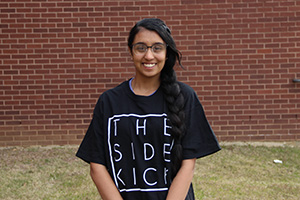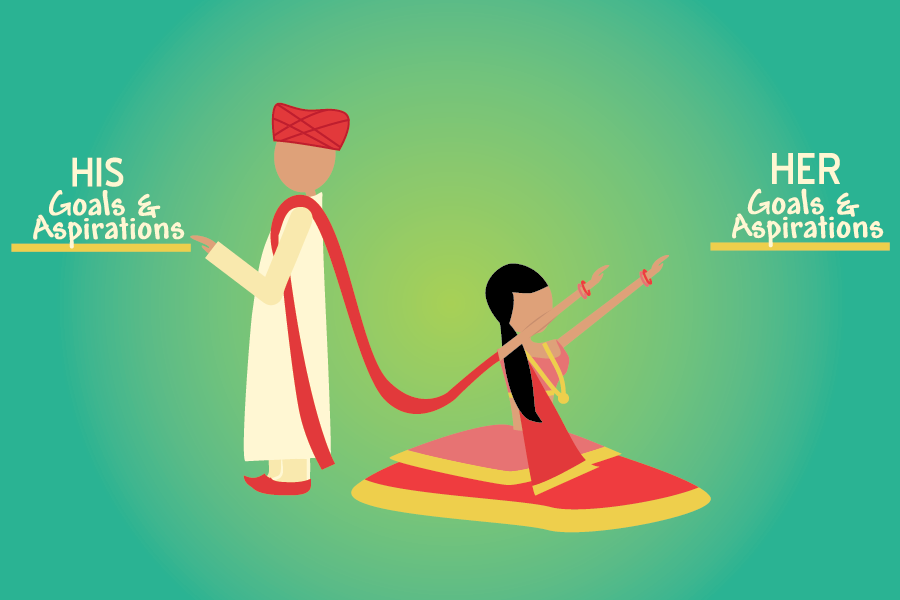The unmarried stigma: why independence is an option

More stories from Sakshi Venkatraman
Apparently, it is wedding season in India.
The other day, I overheard a painfully familiar phone conversation take place between my mother and her aunt, who lives back home. They were discussing the “marrying off” of one of our relatives and another close family friend in their late 20s or early 30s, respectively.
Their conversation is one I have heard many times before, and one I do not doubt I will hear again as soon as the next bride-in-training comes of age. However, this time, their words left me feeling particularly irritated.
Both girls, in comparison to tradition, are past the “ideal” age for marriage, which is around 23 or 24, and their parents were panicking. To my understanding, this is a focal point in each of their decisions to commit.
But it is OK, they are getting married now, so the world can officially return to a balanced state, right?
The life cycle of the average South Asian woman is extremely regimented, and as I get older, the looming milestones on this list creep far too close for comfort.
On a recent trip to India, one of my mother’s sweet, well-intentioned friends told me that she wanted me married by 22-years-old. Although the assertion took me by surprise, I took it with a grain of salt because, realistically, she had no direct power over my decisions. If that comment had come from someone close to me, like my mother for instance, I would have been worried.
For many Indian girls my age, statements like these are a commonality, coming from mothers, fathers, aunts, uncles and grandparents in a much more real way.
Be born, go to school, get a degree, graduate, get married, have kids then die.
Granted, it is an exaggerated outline but it is far more true than I would like it to be. The culture in India, and many Asian countries, is one that is driven by the image of a submissive woman. One that is marked from birth as not an independent human but as someone that needs a man for survival.
The family of my late grandmother denied her the opportunity to go to college and study medicine. She was instead, “married off” at 17-years-old and had her first child at 18-years-old. It still leaves me in awe to think that she was married and pregnant at the age I am now.
Times are changing, that I will agree to. The saddest part to the story is that my grandmother’s sister, just a few years younger than she was, was allowed to go to medical school and practiced for many years.
Women in the more evolved communities of India are encouraged to go to school and even work. But the stigma of being 30 and unmarried, still exists in a very prevalent way.
Relationships are wonderful, but they should also unfold as you want them too. Independence, as well as emotional and financial self-sufficiency should be encouraged from an early age. The stigma involved with focusing on a career or education over getting married needs to be done away with.
The unfortunate reality is, some girls’ understanding of their own complexity has become so shallow due to a culture that has convinced them that their only purpose is to get married and have kids. They do not even consider anything else as an option.
Women are not mass produced in factories and distributed with uniform instruction manuals. Everyone is beautifully complex and unique, and no culture can have the same expectations for how all of their lives are supposed to play out.
It starts from ground zero – as I get older, I am seeing many of my friends fall in line and start long term relationships. No matter how happy I am for them, there are parts of me that feel inferior when I am single. Just like everyone, I have longed to be one of the masses for a very long time.
I have only recently come to realize that relationships do not define me. Just like everyone who identifies themself female, I am a woman. I am not, however, a girlfriend or a wife.
If I choose to commit to someone, that will be a part of me, not all of me, and I refuse to let myself be defined by that. I belong to myself, and so do you – so does everyone.
There are still places, in less developed communities of India, where girls in their teens are forced to marry men in their 40s and are prevented from getting an education. Even though the world is slowly evolving, millions of girls are still being told that they are nothing but a mother and a wife.
The world should start encouraging women to be independent, that is when their subjugation will end.

Sakshi Venkatraman is a senior at Coppell High School. This is her second year as news editor and third year on staff. Sakshi enjoys writing creatively...

Manu is the Graphics editor and Webmaster for the Sidekick Newspaper. This is her second year on staff as well as her second year with experience in graphic...




Ravikishore Nayani • Jan 27, 2016 at 2:25 pm
I like the way you think Woman is not reproduction Factory. God has created both men and women equally.
One thing you have to look in is in arranged marriages most of the family and individuals bag round check will be completed by parents. Girl and Boy part is to look at compatibility.
Meha Srivastav • Jan 27, 2016 at 1:35 pm
And the graphic is so good!
Meha Srivastav • Jan 27, 2016 at 1:34 pm
I really like your story, Sakshi! It’s definitely something that the urban parts of India are overcoming, but you are so right- the notions of the ‘ideal’ age and criterion for a woman to be married still exist so unashamedly today. It is just horrible that it is so prevalent in this day and age.
Venky Venkatraman • Jan 27, 2016 at 12:38 pm
Good article!
I liked the phrase “If I choose to commit to someone, that will be a part of me, not all of me, and I refuse to let myself be defined by that. I belong to myself, and so do you – so does everyone.”.
However, the flip side of that argument is that all relationships will be transient and the concept of life long marriage to one person will become a thing of antiquity.
That would be fine except for the children from those temporary unions who will not have any constancy during their childhood.
Unfortunately, there is no perfect solution ….
Laila • Jan 27, 2016 at 10:49 am
OMG this is so true! It is horrible that women have to bear such a stigma just for wanting to be independent. If they are concerned about getting married then that’s their choice. No one should try to be concerned FOR them because it ends up just putting a lot of pressure on them. It was so brave of you to write this! Kudos to you and the Sidekick for taking the initiative.
jayashree arunachalam • Jan 26, 2016 at 6:28 pm
Hi Sakshi
This is so well written and captures the Indian mindset perfectly!
There is really no point in raising a girl and telling her that nothing is beyond her reach, if she is given the feeling that she is somehow inadequate because she is not “settled” by the “right age”.
I like that you realize that your relationship does not define you.